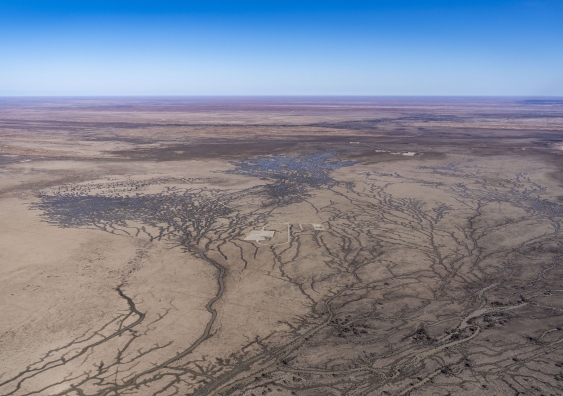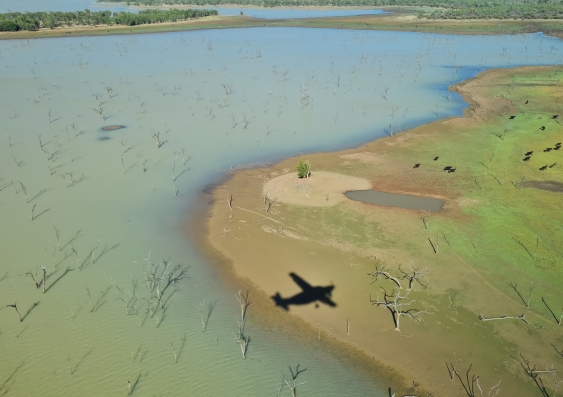UNSW leads global effort to protect iconic African river basin
2025-07-18T10:50:00+10:00

An aerial view of the Cubango-Okavango River Basin taken by Professor Richard Kingsford.
Photo: UNSW Sydney
From Botswana, UNSW researchers have collaborated with international partners to protect the future of the Cubango-Okavango River Basin.
UNSW Sydney researchers, as part of a initiative, recently joined 60 international delegates at a workshop in Botswana focused on protecting the Cubango-Okavango River Basin (CORB).
Spanning Angola, Namibia and Botswana, the CORB is a large inland river basin that ends in the Okavango Delta, a , renowned for its diverse wildlife. It provides water to an estimated and plays a vital role in agriculture, fishing and tourism across the region.
The workshop focused on how the river basin’s biodiversity and ecosystem services are changing with development, and brought together representatives from the , the and other global experts.
The event examined what ecosystem changes mean for access to clean water, food and flood protection, as well as exploring strategies to address them.
UNSW Professor Richard Kingsford worked with colleagues to apply the to the entire CORB. This system-wide inventory of the Basin has created a unified framework for conservation across borders.
“By mapping every habitat, from river channels and floodplains to savannah woodlands and even groundwater microbes, we can develop a standardised jigsaw‑style blueprint for the basin,” he said.
“This level of detail means we can pinpoint the right management actions, whether it’s protecting wildlife corridors, restoring forests and peatlands or securing water quality for downstream communities.”
Prof. Kingsford added that the workshop’s collaborative approach demonstrated UNSW’s expanding input into global environmental solutions.
“Working alongside experts from Angola, Botswana, Namibia, Australia, the US, England and South Africa we are working at a new standard for how to safeguard ecosystems at the river basin scale, ensuring the life‑support services people depend on such as clean water, food security and flood protection are maintained for generations to come.”
UNSW Professor David Keith, who was integral to developing the Global Ecosystem Typology, was also there in Botswana.
“This workshop was an excellent opportunity to share ideas and experiences in ecosystem management between regional specialists and international experts,” he said.
“There is a surprising breadth and depth of data and knowledge on the Cubango-Okavango when it is all brought together in this way. A new ecosystem inventory, including maps, will be foundational for planning and management decisions aimed at reducing risks to the fragile ecosystems of the basin.”
Next steps to secure the basin’s future
Attendees at the workshop mapped out the following next steps over coming months to better protect and manage the basin’s unique ecosystems:
- A first-of-its-kind ecosystem map of terrestrial and aquatic environments across the CORB, identifying gaps in current knowledge by combining available maps with expert input from delegates.
- A detailed report for each ecosystem, including the key ecological processes, major threats, possible management strategies, and data gaps. These reports will also feature photographs to highlight the unique features of each ecosystem.
- A scientific publication to be developed to share the workshop’s findings with the wider research community.
The workshop also produced a set of key recommendations to designed to guide national governments, NGOs and potential investors across the region.
In addition to the central recommendation of a standardised, cross-border map, the workshop called for broader, basin-wide investments in ecosystem health, beyond fragmented efforts focused on specific areas or species. Regular public reporting using satellite and biodiversity data was also recommended to track ecosystem indicators.
Improved communication and collaboration across government, private and non-government sectors was also identified as essential for basin-scale solutions and investment.
Finally, the workshop emphasised the importance of strengthening connections between local communities and decision-makers across the basin.
The Global Typology
The workshop marked the first time the Global Ecosystem Typology has been applied to an entire river basin. By identifying, defining and describing every ecosystem, the typology creates a shared language for scientists, policy‑makers and local managers.
“Each piece of the Cubango‑Okavango Basin, whether it’s a river channel, a savannah or a swamp, is precisely shaped and located. That level of detail has never been available at this scale before,” Prof. Kingsford explained.
“We can now compare ecosystems in the Okavango with those in the Amazon or the Mekong, and that comparison drives better prevention, restoration and reporting.”
Historically, biodiversity conservation has focused on individual species because they’re easier to count and protect. The Global Ecosystem Typology shifts the emphasis to whole ecological communities, ensuring that plants, animals, fungi and the very physical environments they depend on are all considered together.
Long-standing collaboration
Prof. Kingsford said the workshop built on years of collaboration and knowledge-sharing between Australia’s Lake Eyre Basin and the Cubango-Okavango system. As part of this partnership, the Lake Eyre Basin Alliance sponsored a visit by delegates from Angola, Namibia and Botswana to the Lake Eyre Basin.
“This workshop is the culmination of a journey that began with connecting the Lake Eyre Basin Alliance with the Okavango River Basin Commission, sharing lessons in managing free-flowing rivers under pressure,” Prof. Kingsford said.
The international collaboration grew from a shared recognition that both river basins face similar challenges - including upstream development, extractive industries and climate variability. They also sustain rich biodiversity, are vital to Indigenous communities and exist in water-scarce regions of the world.
This workshop is the culmination of a journey that began with connecting the Lake Eyre Basin Alliance with the Okavango River Basin Commission.
Through Prof. Kingsford’s leadership, the Lake Eyre and Okavango partnership has matured. Prior to the workshop he was in Botswana leading an undergraduate course in ecosystem management, which brought together students from UNSW, the University of Botswana, King’s College London and Arizona State University.
Dr Mpaphi Casper Bonyongo, Director of the Okavango Research Institute, said the workshop provided a vital opportunity for collaboration between local, regional and international stakeholders to ensure the long-term health of the river basin.
“Tracking trajectories of change for the Cubango Okavango River Basin cannot be done without credible data. Data paucity on important transboundary water resources variables remains a major constraint to informed management decisions,” Dr Bonyongo said.
“This workshop is timely as it provides a platform for stakeholders involved in transboundary river basin management to discuss the significance of data generation and sharing.”
Phera Ramoeli, Secretary of the Okavango River Basin Commission said: “This workshop comes at an opportune time when there are number of looming challenges including climate change which are affecting the status of our water resources and ecological diversity.
“The opportunity for learning and sharing of experience from experts from around the world will be very important.”
The event was principally sponsored by the Lake Eyre Basin Alliance with additional support from Khwai Private Reserve, Natural Selection, Machaba Safaris, the National Geographic Okavango Wilderness Project, the Wild Bird Trust and the French Biodiversity Agency.
Media enquiries
For enquiries about this story and interview requests please contact Yolande Hutchinson:
Tel: 0420 845 023
Email: y.hutchinson@unsw.edu.au










